新概念英语第二册笔记-第79课
新概念英语第二册lessonLesson79Byair-2023年学习资料

New words-·Parent n.父母亲-·亲生父母-birth parent-·养父母 foster parent-·单亲父母-single parent-•结婚后他仍和父母住在一起 -.After marriage he still lived with his parent .-•她的父母替她照看孩子。-.Her parents took care of the ba y for her.-•我的父母曾经住在南美洲,所以假期里我常从欧洲乘飞机到他-们那里-.My parents used to live in South America and I use to fly there-from Europe in the holidays.
Lesson 79-By air
·和飞机有关的短语和词汇-乘飞机-by air-空中乘务员-flight attendant机起飞-take off-飞机降落-land landing-飞机上升-gain height 飞机下降-descend-飞机着陆-touch down landed-上飞机-get on he plane-下飞机-get off the plane-在飞机上-on board-国内 航空-domestic/international-非直航-direct/indirect-定 取消/错过航班-book/cancel/miss the
·Be frightened of sth-习惯性的害怕-·他害怕打雷-He is frigh ened of thunder.-Be frightened to do sth-害怕做某事她害怕在黑暗中看到人影-She is frightened to see a figure i the dark.-·她害怕黑暗中可能有鬼-She was frightened that here might be a ghost in the dark.-。-frightenin adj.令人恐惧的-It was a very frightening experience and they were very courageous.-那是一次非常令人恐惧的经历,但他 非常勇敢。-0-frighten vt.使惊恐vi.害怕-He knew that Soli as trying to frighten him,so he smiled to hide is fear.-他知道索利想吓唬他,因此微笑着掩饰自己的恐惧。-Don't put your prices too high or you'll frighten the customer off.-要价别太高,否则os-Check-in desk-check your tic et-pay foree-XINHUA-check your passport-passpor control-give you a boarding card-.5T78,0阳中国收聚热 -中事人民养和国-中南人钢-CAAC-中华人民兴和国-照-批表路沸-登机牌boarding c rd-长号凡.拉等-通行证-251
(完整word版)裕兴新概念英语第二册笔记第79课
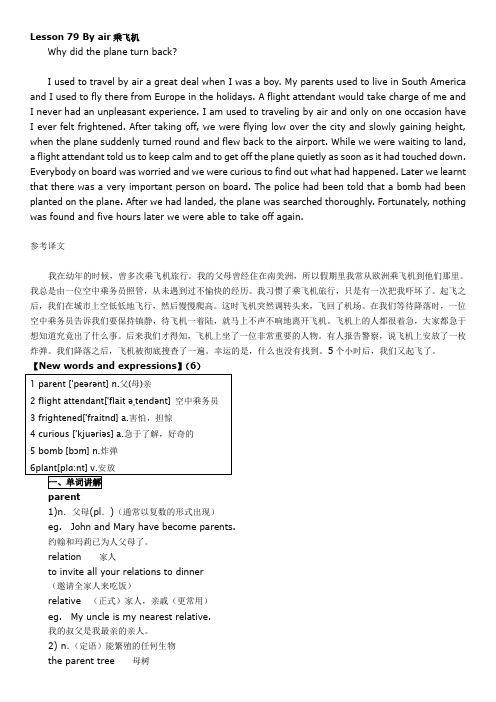
Lesson 79 By air乘飞机Why did the plane turn back?I used to travel by air a great deal when I was a boy. My parents used to live in South America and I used to fly there from Europe in the holidays. A flight attendant would take charge of me and I never had an unpleasant experience. I am used to traveling by air and only on one occasion have I ever felt frightened. After taking off, we were flying low over the city and slowly gaining height, when the plane suddenly turned round and flew back to the airport. While we were waiting to land, a flight attendant told us to keep calm and to get off the plane quietly as soon as it had touched down. Everybody on board was worried and we were curious to find out what had happened. Later we learnt that there was a very important person on board. The police had been told that a bomb had been planted on the plane. After we had landed, the plane was searched thoroughly. Fortunately, nothing was found and five hours later we were able to take off again.参考译文我在幼年的时候,曾多次乘飞机旅行。
裕兴新概念英语第二册笔记第79课课文讲解
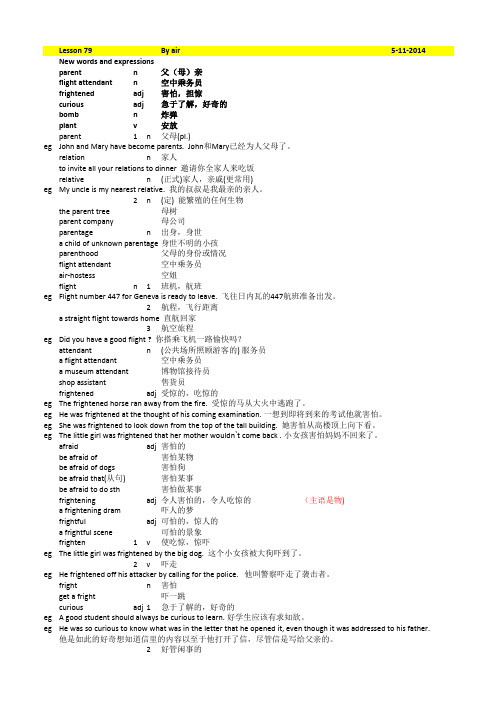
Lesson 795-11-2014New words and expressions parent n 父(母)亲flight attendant n 空中乘务员frightened adj 害怕,担惊curious adj 急于了解,好奇的bomb n 炸弹plant v 安放parent 1n 父母(pl.)egJohn and Mary have become parents. John 和Mary 已经为人父母了。
relation n 家人to invite all your relations to dinner 邀请你全家人来吃饭relative n (正式)家人,亲戚(更常用)egMy uncle is my nearest relative. 我的叔叔是我最亲的亲人。
2n (定) 能繁殖的任何生物the parent tree 母树parent company 母公司parentage n 出身,身世a child of unknown parentage 身世不明的小孩parenthood 父母的身份或情况flight attendant 空中乘务员air-hostess 空姐flight n 1班机,航班egFlight number 447 for Geneva is ready to leave. 飞往日内瓦的447航班准备出发。
2航程,飞行距离a straight flight towards home 直航回家3航空旅程egDid you have a good flight ? 你搭乘飞机一路愉快吗?attendant n (公共场所照顾游客的) 服务员a flight attendant 空中乘务员a museum attendant 博物馆接待员shop assistant 售货员frightened adj 受惊的,吃惊的egThe frightened horse ran away from the fire. 受惊的马从大火中逃跑了。
(待分)新概念二79课知识点整理
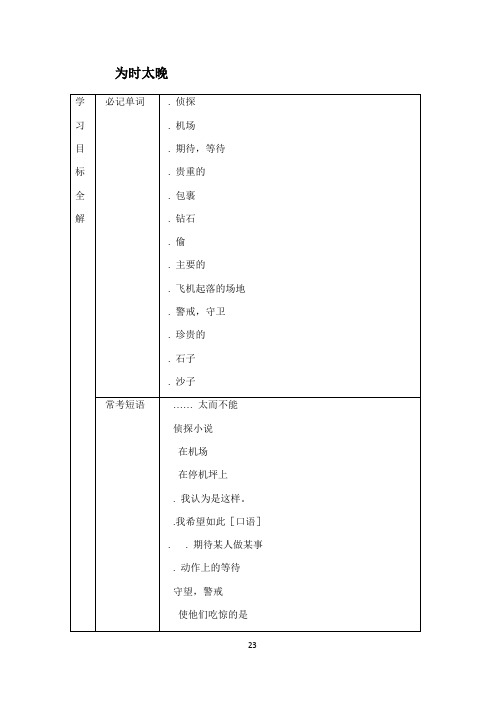
过去进行时
过去进行时的构成:的过去式现在分词
过去进行时和一般过去时经常同在一个句子里使用。过去进行时表示过去正在进行的动作或情况,一般过去时则表示比较短暂的动作或事件。
正在进行中的动作或情况往往由连词,,,
等引导。
,当……时候(强调动作同时发生)
从句,动词一定是延续性动词
延续性动词瞬间动词
能用代替,但是却不一定能用代替。通常只引导持续时间较长的动作,
(,).偷.抢(某人)
① .偷盗,行窃
英语中“偷”用和来表达,宾语是物,用。宾语是人,用。跟地点相连,也用
.偷(某物)
.
.约翰从不偷东西。
拓展:
.抢(某人)
.
② .巧妙地占用,偷偷地弄到手
’ .他已赢得玛丽的芳心。
③ .偷偷地行动,悄悄靠近
.他悄悄地进了房间
、, .当飞机到达时,一些侦探等候在主楼内,另一些侦探则守候在停机坪上。
. .
她和我都是学生。
.
这两个计划都不错。
()指三者或者三者以上都
. .
我们所有人都应该去那里。
.
他们都同意待在这儿。
2.的用法
()表示“每一个”之意,用来指两个或两个以上的人或事物,强调个体。可作名词或形容词,在句中充当主语,定语,宾语等。直接作主语时,谓语动词用第三人称单数。
. .
这条街的每一边都有树。
表示星期:;
在星期一早上
表示日期:
表示星期日期:
,
表示具体时间:
我哥哥的生日是月日。
’ .
(3)用的时间短语:具体到某一时间点
表示确切的时间:
’ ’
表示用餐时间:
表示其他时刻:
裕兴新概念英语第二册笔记_第79课.
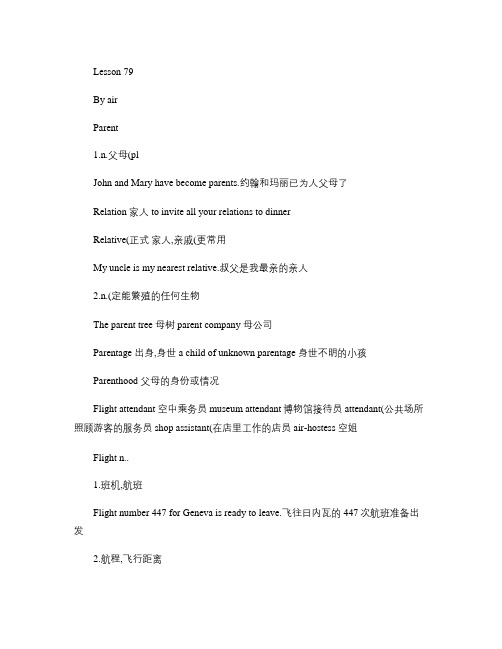
Lesson 79By airParent1.n.父母(plJohn and Mary have become parents.约翰和玛丽已为人父母了Relation 家人to invite all your relations to dinnerRelative(正式家人,亲戚(更常用My uncle is my nearest relative.叔父是我最亲的亲人2.n.(定能繁殖的任何生物The parent tree 母树parent company 母公司Parentage 出身,身世 a child of unknown parentage 身世不明的小孩Parenthood 父母的身份或情况Flight attendant 空中乘务员museum attendant博物馆接待员attendant(公共场所照顾游客的服务员shop assistant(在店里工作的店员air-hostess 空姐Flight n..1.班机,航班Flight number 447 for Geneva is ready to leave.飞往日内瓦的447次航班准备出发2.航程,飞行距离A straight flight towards home 直航回家3.航空旅程Did you have a good flight? 你搭乘飞机一路愉快吗?Frightened adj.受惊的,吃惊的The frightened horse ran away from the fire.受惊的马从大火中逃跑了He was frightened at the thought of his coming examination.一想到即将到来的考试他就害怕She was frightened to look down from the top of the tall building.他害怕从楼顶向下看The little girl was frightened that her mother wouldn’t come back.小女孩害怕妈妈不回来了Afraid adj.害怕的be afraid of 害怕某物be afraid of dogs be afraid that 害怕某事Be afraid to do 害怕做某事Frightening adj.令人受惊的 a frightening dream 吓人的梦Frightful adj. 可怕的,惊人的 a frightful scene 可怕的景象Frighten1.v.使吃惊,惊吓The little girl was frightened by the big dog.这个小女孩被大狗吓到了2.v.吓走He frightened off his attacker by calling for the police.他叫警察吓走了袭击者Fright n. 害怕get a fright 吓了一跳Curious adj.1.急于了解的,好奇的A good student should always be curious to learn.好学生应有求知欲He was so curious to know what was in the letter that he opened it, even though it was addressed to his father.他如此好奇想知道信里内容,于是他打开了信,尽管信是写给父亲的2.好管闲事的My neighbors are very curious. 我的邻居们非常好管闲事Curiosity n. 好奇,好奇心out of curiosity 出于好奇The boy burned with a curiosity to know what was in the letter addressed to his mother.这个男孩极想知道写给妈妈的信里的内容Bomb 形近词comb梳子1.炸弹plant a bomb in the post office 在邮局安放一枚炸弹2.原子弹Has that country got the bomb?那个国家有原子弹么?Go like a bomb (指交通工具行进快速,疾驶My new car goes like a bomb.Spend a bomb/cost a bomb 花了许多钱Bomber 轰炸机fighter战斗机Plant1.v. 安放He planted himself in a chair by the fire.他稳坐在炉边的椅子上He planted a knife in her back.他在她背上插了一刀2.v.种植April is the time to plant.四月是种植的时间3.v.播种,培植The hillside was planted with trees.上坡上被种满了树4.n.植物All plants need water and light.所有的树都需要水和阳光5.n.工厂They’ve just built a new chemical plant.他们刚刚兴建了一家化学厂Key structures过去时/过去进行时Used to do /was (were+doingTextA flight attendant would take charge of me and I never had an unpleasant experience. Take charge of 负责照料(某人/某物Can you take charge of this class please, miss jones?In someone’s charge/under someone’s charge受管理,由(某人负责This hospital is in her charge until the director comes back这家医院由他负责直到主管回来之前In charge of 负责I’ll be in charge of the whole factory next week when the director is away下周厂子不在的时候我负责Bring a charge against 控告(某人The police brought a charge of murder against me.警方控告我谋杀Unpleasant adj.不愉快的,讨厌的Unpleasant smells恶心的气味unpleasant weather 讨厌的天气A few unpleasant words 一些难听的话an unpleasant experience不愉快的经历Unpleasantness n. 不愉快Don’t let the recent unpleasantness end our friendship.不要让眼下这些不愉快终止我们的友谊Un+adj.构成相反的含义adj.Unpractised 笨手笨脚的unprincipled无原则的,无廉耻的unprofessional非本行的Unmannerly粗鲁的unmarried未婚的unknown不知道的,不知名的Unfortunate 不幸的unforgettable难以忘怀的I am used to traveling by air and only on one occasion have I ever felt frightened.Be used to 习惯于(to为介词Be used to doing /be used to sthI am used to traveling by air.我习惯于坐飞机旅行I am not used to drinking.我不习惯喝酒A man used to country life习惯于乡村生活的男子On one accasion有一次Only引导状语,提前放在句首,要求倒装,助动词have提前Only(seldom,hardly+状语放在句首时,用倒装Only in this way can you hope to improve the situation there.只有用这种方式你才有希望改善那的状况(部分倒装Hardly had he finished when someone rose to refute his views.他刚一讲完就有人站起来驳斥他的观点Scarcely had she fallen asleep when a knock at the door awakened her.她刚一睡着就被敲门声吵醒了Not until quite recently did I have any idea what a guided missile was like.知道最近我才清楚导弹是什么样的以never,little,often等词引导的句子,也常用倒装语序Never before has our country been as united as it is today.今天我们的国家空前团结Many a time has he given us a good advice.他有很多次给我们好的建议Little did we suspect that the district was so rich in mineral resources.我们一点也没想到这个地区的矿产资源如此丰富Often did we warn them not to do so.我们经常警告他不要这样做After taking off, we were flying low over the city and slowly gaining height,when(at that time the plane suddenly turned round(turn around掉头 and flew back to the airport.Fly low over在…上方低低的飞行fly back to 飞回Fly1.v.飞,飞行How did you get here? I flew. (I came by airportA bee flew in through the open window.一只蜜蜂从开着的窗子飞了进来2.v.开飞机He was the first man ever to fly that type of aircraft.他是第一个开那种类型飞机的人3.v.搭乘飞机I always fly British Airways.我经常搭乘英航的飞机习语:I must fly/We must fly 我必须快点了(口急忙离去Fly into a temper勃然大怒The bird has flown犯人逃跑了Make the dust fly/make the fur fly/make the sparks fly引起争吵Slowly/graduallyGain height爬高gain speed加速gain experience获得经验Turn away拒伸援手Turn back 1.往回走2.把(某页的角折起来Turn the page back and it will mark your place把某页折个角,做个记号Turn down 1.减弱,降低Turn that radio down at once.2.拒绝She turned him down.Turn in 1.归还You must turn in your uniform when you leave the army.当你离开部队的时候你要归还制服2.(美交,缴This is a poor piece of work you’ve turned in.你交的作品很糟糕While we were waiting to land, a flight attendant told us to keep calm and to get off the plane quietly as soon as it had touched down.Land v.着陆This plane can land anywhere.这架飞机可以着陆在任何地方Keep calm 保持镇定keep+adj. keep warm 保暖keep silent 保持沉默Tell sb. to do …. Tell us to keep calm告诉我们保持镇定Tell us to get off the plane quietly告诉我们安静的下飞机Touch down/land飞机着陆Everybody on board was worried and we were curious to find out what had happened.On board在…(如飞机,船上上Go by the board(指计划,安排等完全失败sweep the board在选举中几获全胜Above board完全公开而手段正当Be curi ous to do…好奇做Later we learnt that there was a very important person on board.Learn/know very important person缩写VIP vip cardThe police had been told that a bomb had been planted on the plane. After we had landed, the plane was searched thoroughly(completely.Fortunately, nothing was found and five hours later we were able to take off again.Take off1.起飞2.脱下(put onHe took off his coat.3.模仿He is always taking his teacher off他总是模仿他的老师.以诙谐或嘲讽的方式模仿或假扮某人Take after 像Young Tom takes after his father/Young Tom resembles his father.在长相或性格方面像父亲或母亲Take up1.填满,占据(空间或时间The wardrobe takes up a lot of space/The wardrobe occupies a lot of space.这个衣柜很占空间2.开始从事某事He has taken up French/He has begun to learn French.他开始学习法语Take to 逐渐习惯于做某事When his wife died, he took to drinking他妻子死后,他染上酗酒的习惯Take to +n. /doingTake in 欺骗,蒙蔽或愚弄某人He was so persuasive that I was taken in/He was so persuasive that I was deceived.他真能说我被欺骗了Take down (write down写下,记下The reporter took down everything I said.Take over接受,接管be in charge ofThe business was doing very badly until Jones took over.琼斯接手之前公司业绩很差。
新概念二第79课笔记默写
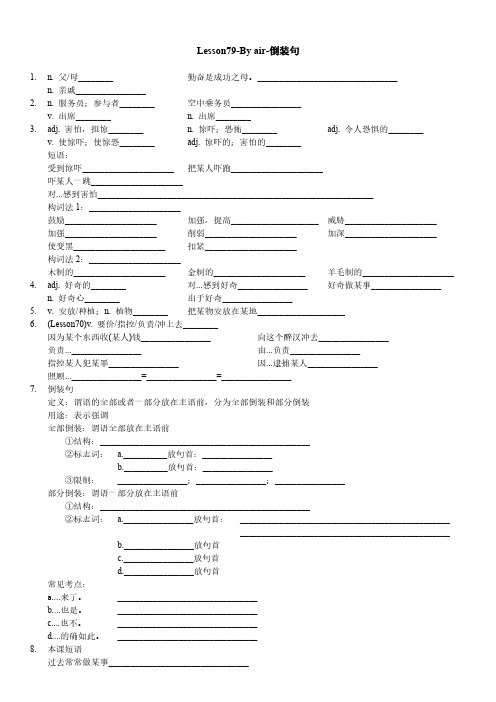
Lesson79-By air-倒装句1.n.父/母________勤奋是成功之母。
________________________________n.亲戚________________2.n.服务员;参与者________空中乘务员________________v.出席________n.出席________3.adj.害怕,担惊________n.惊吓;恐怖________adj.令人恐惧的________v.使惊吓;使惊恐________adj.惊吓的;害怕的________短语:受到惊吓_____________________把某人吓跑_____________________吓某人一跳_____________________对...感到害怕_______________________________________________________________构词法1:_____________________鼓励_____________________加强,提高____________________威胁_____________________加强_____________________削弱_____________________加深_____________________使变黑_____________________扣紧_____________________构词法2:_____________________木制的_____________________金制的_____________________羊毛制的_____________________ 4.adj.好奇的________对...感到好奇________________好奇做某事________________n.好奇心________出于好奇________________5.v.安放/种植;n.植物________把某物安放在某地____________________6.(Lesson70)v.要价/指控/负责/冲上去________因为某个东西收(某人)钱________________向这个醉汉冲去________________负责...________________由...负责________________指控某人犯某罪________________因...逮捕某人________________照顾...________________=________________=________________7.倒装句定义:谓语的全部或者一部分放在主语前,分为全部倒装和部分倒装用途:表示强调全部倒装:谓语全部放在主语前①结构:________________________________________________②标志词: a.__________放句首:________________b.__________放句首:________________③限制:________________;________________;________________部分倒装:谓语一部分放在主语前①结构:________________________________________________②标志词: a.________________放句首:________________________________________________________________________________________________b.________________放句首c.________________放句首d.________________放句首常见考点:a....来了。
新概念英语第二册第79课-By air
新概念英语第二册第79课:By airLesson 79 By air乘飞机First listen and then answer the question.听录音,然后回答以下问题。
Why did the plane turn back?I used to travel by air a great deal when I was a boy. My parents used to live in South America and I used to fly there from Europe in the holidays. A flight attendant would take charge of me and I never had an unpleasant experience. I am used to travelling by air and only on one occasion have I ever felt frightened. After taking off, we were flying low over the city and slowly gaining height, when the plane suddenly turned round and flew back to the airport. While we were waiting to land, a flight attendant told us to keep calm and to get off the plane quietly as soon as it had touched down. Everybody on board was worried and we were curious to find out what had happened. Later we learnt that there was a very important person on board. The police had been told that a bomb had been planted on the plane. After we had landed, the plane was searched thoroughly. Fortunately, nothing was found and five hours later we were able to take off again.参考译文我在幼年的时候,曾多次乘飞机旅行。
By air 乘飞机:新概念英语第二册自学导读笔记第79课
By air 乘飞机:新概念英语第二册自学导读笔记第79课新概念英语第二册第79课课文重难点 further notes on the text1.a flight attendent would take charge of me…我总是由一位空中乘务员照管……would表示过去经常发生的事,它与 used to的区别参见第55 课语法。
take charge(of)为固定短语,表示"接管"、"开始管理"等:she took charge of the child after his parents died. 孩子的父母去世后,她接管了那孩子。
the new manager will take charge (of the company) from next week. 新经理从下星期开始管理公司。
2.…only on one occasion have i ever felt frightened.……仅仅有一次把我吓坏了。
这是一个倒装句。
倒装句的结构为"副词+助动词(be, do, have, can, must等)+主语+句子的其余部分"。
它通常用来增强语气,是典型的正式修辞和正式文体。
用倒装句的情况包括:(1)句首为否定或近似否定的副词(never, rarely, little, on no occasion, hardly, no sooner…than等):never has he got so many letters. 他从未收到过这么多信。
little does he realize how important this meeting is. 他对这个会议的重要性知之甚少。
on no occasion must you accept any money if he offers it.他如果给你钱,你可绝不能接受。
新概念二第79课笔记
课堂笔记(一)1)used to do我们用used to do 表示过去有过但现在已不存在的习惯,以便将过去与现在形成对照。
它后面经常用由but now...,but not...any more/any longer 等构成的、用了一般现在时的句子以强调过去和现在的不同之处。
Do you watch television?I used to, but I don' t any longer.你看电视吗?我过去常看,但现在不看了。
I used to smoke, but I don't any more/any longer.我过去常吸烟,但现在已不吸了。
He used to be a lazy boy, but now he is very hard-working.他过去是个懒孩子,但现在他很勤奋。
used to 仅用于一般过去时。
它的疑问句和否定句形式可以不用助动词do 而用used 本身:Used he to smoke?He usedn' t / used not to smoke.did didn' t他过去吸烟吗?他从前并不吸烟。
但比较常用的形式是did和didn't:Did he use to smoke?He didn' t use to smoke.他过去吸烟吗?他从前不吸烟。
在针对used to提问时,一般也用didI used to be a good swimmer.Did you really? I didn' t even know you could swim.Did you use to smoke?Yes, I did / used to.我过去是个游泳好手。
真的吗?我以前甚至不知道你会游泳。
你从前吸烟吗?是的,我吸。
would 是另一个用于描述过去经常性行为的词,它与used to有时可以互换,有时则不可以,而且would 需要指出具体时间,used to 则不需要。
逐句精讲新概念英语第二册:第79课乘飞机
Lesson 79 By air 新概念英语2课⽂内容: I used to travel by air a great deal when I was a boy. My parents used to live in South America and I used to fly there from Europe in the holidays. A flight attendant would take charge of me and I never had an unpleasant experience. I am used to travelling by air and only on one occasion have I ever felt frightened. After taking off, we were flying low over the city and slowly gaining height, when the plane suddenly turned round and flew back to the airport. While we were waiting to land, a flight attendant told us to keep calm and to get off the plane quietly as soon as it had touched down. Everybody on board was worried and we were curious to find out what had happened. Later we learnt that there was a very important person on board. The police had been told that a bomb had been planted on the plane. After we had landed, the plane was searched thoroughly. Fortunately, nothing was found and five hours later we were able to take off again. 新概念英语2课⽂内容:句⼦讲解: 1、I used to travel by air a great deal when I was a boy. 当我还是个⼩孩⼦的时候,曾多次乘飞机旅⾏。
- 1、下载文档前请自行甄别文档内容的完整性,平台不提供额外的编辑、内容补充、找答案等附加服务。
- 2、"仅部分预览"的文档,不可在线预览部分如存在完整性等问题,可反馈申请退款(可完整预览的文档不适用该条件!)。
- 3、如文档侵犯您的权益,请联系客服反馈,我们会尽快为您处理(人工客服工作时间:9:00-18:30)。
--Lesson 79By Air?【Text】Iused to travel by air agreat deal when I wasaboy. Myparents used tolive in SouthAmericaand I used tofly therefromEurope inthe holidays. A flight attendantwould takecharge of me and Inever hadan unpleasant experience. I amused to traveling by air andonly on one occasion haveI everfeltfrightened. Aft ertakingoff,we wereflying low over thecityandslowlygainingheight,whenthe plane suddenly turnedroundand flewback totheairport. Whilewewere waitingto land, a flight attendant told us to keepcalmand to get off theplanequietly as soon as it hadtoucheddown.Everybodyon board was worried and we were curious to find out whathadhappeter welearnt thatthere was a veryimportant personon board. Thepolice hadbeento ld thatabomb had been planted on the plane. After we hadlanded,the plane was searched thoroughly. Fortunately,nothing wasfound and fivehours laterwe wer eable totake off again.【课文翻译】我在幼年的时候,曾多次乘飞机旅行。
我的父母曾经住在南美洲, 所以假期里我常从欧洲乘飞机到他们那里。
我总是由一位空中乘务员照管,从未遇到过不愉快的经历。
我习惯了乘飞机旅行,只是有一次把我吓坏了。
起飞之后,我们在城市上空低低地飞行,然后慢慢爬高。
这时飞机突然调转头来,飞回了机场。
在我们等待降落时,一位空中乘务员告诉我们要保持镇静,待飞机一着陆,就马上不声不响地离开飞机。
飞机上的人都很着急,大家都急于想知道究竟出了什么事。
后来我们才得知,飞机上坐了一位非常重要的人物。
有人报告警察,说飞机上安放了一枚炸弹。
我们降落之后,飞机被彻底搜查了一遍。
幸运的是,什么也没有找到。
5个小时后,我们又起飞了。
Newwordsand expressions生词和短语【生词讲解】1.parent1)n父母(pl.)eg: Johnand Maryhave become parents.--John和Mary已经为人父母了。
词汇拓展:relation n家人toinviteallyourrelationsto dinner 邀请你全家人来吃饭relative n(正式)家人,亲戚(更常用) eg My uncle is mynearest relative.我的叔叔是我最亲的亲人。
2)n (定) 能繁殖的任何生物the parenttree母树parent company母公司parentagen出身,身世a childof unknownparentage身世不明的小孩parenthood 父母的身份或情况2.flightattendant空中乘务员air-hostess空姐flight1)班机,航班eg:Flightnumber447for Geneva isready to leave.飞往日内瓦的447航班准备出发。
2)航程,飞行距离a straightflight towards home 直航回家3)航空旅程eg: Didyou have agood flight ? 你搭乘飞机一路愉快吗?attendant n(公共场所照顾游客的) 服务员a flight attendant空中乘务员a museumattendant 博物馆接待员shop assistant 售货员3. frightenedadj受惊的,吃惊的eg:The frightened horseranaway from the fire.受惊的马从大火中逃跑了。
eg:Hewasfrightened atthethoughtofhis coming examination.一想到即将到来的考试他就害怕。
eg:She was frightened to look down from the topof thetall building.她害怕从高楼顶上向下看。
eg:The little girlwas frightened thather motherwouldn`tcomebac k.小女孩害怕妈妈不回来了。
区别afraid adj 害怕的be afraidof 害怕某物beafraidof dogs害怕狗be afraidthat(从句)害怕某事be afraid to do sth害怕做某事frightening adj 令人害怕的,令人吃惊的(主语是物)a frightening dram 吓人的梦frightful adj 可怕的,惊人的afrightfulscene 可怕的景象frighten1) v使吃惊,惊吓eg:The little girl was frightened by the big dog.这个小女孩被大狗吓到了。
2)v吓走eg: Hefrightened off his attacker by callingforthe police.他叫警察吓走了袭击者。
fright n 害get a fright吓一跳4.curious1) 急于了解的,好奇的eg:A goodstudent should alwaysbe curious tolearn.好学生应该有求知欲。
eg:He was socurious to know what was in the letterthat he openedit, even though it was addressedtohisfather.他是如此的好奇想知道信里的内容以至于他打开了信,尽管信是写给父亲的。
2)好管闲事的eg:My neighborsare verycurious.我的邻居们非常爱管闲事。
curiosity n 好奇,好奇心outofcuriosity 出于好奇eg:The boy burnedwith a curiosity to knowwhat was in the letter addre ssedto his mother.这个孩子极想知道写给妈妈的信里的内容。
5.bomb1)n 炸弹形近词:comb 梳子plantabomb in the postoffice 在邮局安放一枚炸弹2)原子弹eg:Hasthat county got the bomb?那个国家有原子弹吗?习语: golike a bomb(指交通工具)行进快速,疾驶eg:Mynewcar goes likebomb.我的新车行进非常快。
spend a bomb/ cost a bomb 花了许多钱bomber n 轰炸机fighter n 战斗机6.plant1) v 安放eg:He planted himself in a chair bythe fire.他稳坐在炉火边的椅子上。
plant oneself (安放自己=稳坐)eg: He planted a knife inherback.他在他的背上插了一刀。
2) v 种植eg:April isthetimeto plant.四月是种植的时间。
3)v 播种,培植eg: The hillside was planted with trees.山坡上被种满了树。
4) n植物eg: All plants need water andlight.所有的植物都需要水和阳光。
5) n 工厂eg:They`ve just built anew chemical plant.他们刚刚兴建一所化学厂。
【课文讲解】1.I usedto travel by air a greatdeal whenI was a boy. My parentsusedto livein SouthAmerica andI usedto flythere from Europe inthe--holidays.①usedto do我们用used to do表示过去有过但现在已不存在的习惯,以便将过去与现在形成对照。
它后面经常用由but now...,but not...any more/any longer等构成的、用了一般现在时的句子以强调过去和现在的不同之处。
ﻫeg:-Do you watch television?-I usedto,butIdon't any longer.- 你看电视吗?ﻫ-我过去常看,但现在不看了。
ﻫeg:I used to smoke, but I don't any more/anylonger.我过去常吸烟,但现在已不吸了。
eg:He usedto be alazyboy, but now he isvery hard-working.他过去是个懒孩子,但现在他很勤奋。
在针对used to提问时,一般也用dideg: -I used to be agood swimmer.- Did you really?I didn'teven knowyou could swim.ﻫ-Didyou use tosmoke?ﻫ- Yes, I did /usedto.- 我过去是个游泳好手。
ﻫ-真的吗?我以前甚至不知道你会游泳。
- 你从前吸烟吗?- 是的,我吸。
区别:would 是另一个用于描述过去经常性行为的词,它与used to有时可以互换,有时则不可以,而且ﻫwould 需要指出具体时间,used to则不需要。
1) 当used to暗示与现在的对照时,不可用would替换:ﻫeg:Iused to drink heavily, but I have givenup drinkingnow.我过去喝酒很厉害,但我已戒了。
